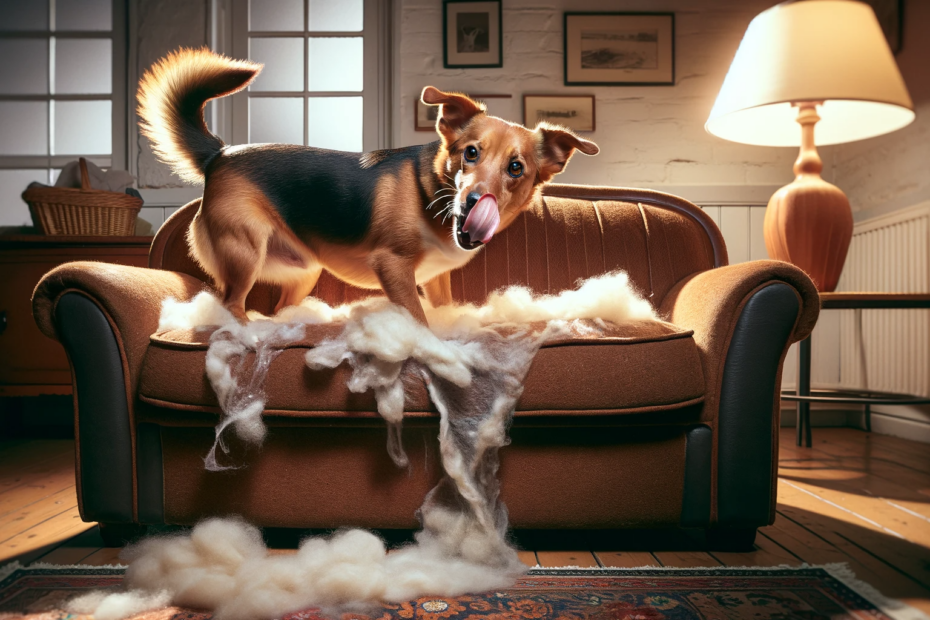Do you ever wonder why on earth dogs would lick the couch? Well, believe it or not, there are actually reasons behind this peculiar behavior.
Dogs may lick the couch if they detect something delicious on it, like leftover crumbs or spilled snacks. Or maybe they’re just captivated by the couch’s texture and find it oddly entertaining.
And let’s not forget about those anxious pups who resort to couch licking as a way to calm themselves down. But fret not, dear dog owner, it’s crucial to tackle the root cause of this behavior and provide suitable alternatives and training to redirect their attention.
So, let’s delve deeper into the world of couch licking and uncover some helpful strategies to keep your furniture slobber-free.
Key Takeaways
- Couch licking in dogs can have various reasons, including attraction to food crumbs, curiosity about the texture, boredom, anxiety, or underlying medical issues.
- Excessive licking of the couch can be a sign of an underlying medical condition or obsessive-compulsive disorder in dogs.
- Lack of mental stimulation and inappropriate outlets for energy can lead to couch licking behavior.
- Addressing the underlying cause, providing mental stimulation, a comfortable resting spot, exercise, and chew toys can help redirect licking behavior and prevent damage to the couch.
Common Reasons for Couch Licking
If your dog is constantly licking the couch, you might be wondering why they engage in this behavior. Couch licking is a common behavior observed in dogs, and there are several reasons why they may exhibit this behavior.
One common reason is that dogs may be attracted to food crumbs or spills on the couch. Their keen sense of smell allows them to detect even the smallest traces of food, and licking the couch becomes a way to satisfy their cravings.
Another common reason for couch licking is curiosity. Dogs may find the texture of the couch interesting and lick it out of sheer intrigue. This behavior is often seen in puppies or young dogs who are exploring their surroundings and trying to understand different objects.
Boredom can also lead to couch licking. When dogs aren’t adequately stimulated or entertained, they may resort to licking the couch as a means of self-entertainment. This behavior can be a sign that your dog needs more mental and physical stimulation.
In some cases, medical issues may be the underlying cause of couch licking. Dogs with anxiety or stress may engage in excessive licking as a self-soothing mechanism. It’s essential to rule out any medical conditions or underlying health issues that may be contributing to this behavior.
Understanding the common reasons for couch licking can help you address the behavior effectively. By providing appropriate mental and physical stimulation, ensuring a clean environment, and addressing any underlying medical issues, you can help your dog overcome this behavior and promote their overall well-being.
Understanding Canine Licking Behavior
When dogs lick the couch, it’s important to understand their canine licking behavior. Licking is a natural behavior in dogs and serves various purposes. It can be a way for dogs to explore their environment, communicate with their owners, or seek comfort. However, excessive licking of the couch can be a sign of an underlying medical condition or behavioral issue that needs to be addressed.
One possible underlying cause for dogs licking the couch excessively is an underlying medical condition. Allergies, skin infections, or gastrointestinal issues can cause dogs to feel uncomfortable and seek relief through licking. If you notice that your dog is licking the couch excessively and also displaying other symptoms such as itching, redness, or gastrointestinal distress, it’s important to consult with a veterinarian to rule out any underlying medical conditions.
In some cases, excessive licking of the couch can also be a sign of obsessive-compulsive disorder (OCD) in dogs. OCD is a behavioral condition where dogs engage in repetitive behaviors, such as excessive licking, that serve no apparent purpose. If you suspect that your dog may have OCD, it’s recommended to seek the assistance of a professional dog behaviorist or trainer who can provide guidance and develop a behavior modification plan.
Another reason why dogs may lick the couch is due to a lack of mental stimulation. Dogs are intelligent animals and need mental stimulation to keep them engaged and satisfied. If a dog is bored or lacks mental stimulation, they may resort to licking the couch as a way to occupy themselves. Providing your dog with appropriate mental stimulation, such as puzzle toys, interactive play, and training exercises, can help redirect their licking behavior and provide them with a healthier outlet for their energy.
To stop your dog from licking the couch, it’s crucial to identify the underlying cause and address it accordingly. Whether it’s a medical condition, OCD, or a lack of mental stimulation, understanding the root cause will help you develop an effective plan to stop the behavior. Additionally, providing your dog with a comfortable resting spot, regular exercise, and appropriate chew toys can also help redirect their licking behavior and promote a healthier lifestyle.
Potential Health Issues Behind Couch Licking
To understand the potential health issues behind couch licking, consider the possible consequences for your dog’s well-being. While it may seem harmless, the act of a dog licking the couch can actually be indicative of underlying health problems. When your dog is licking the furniture excessively, it’s important to recognize that it could be a sign of a medical issue.
One common health concern associated with couch licking is allergies. Dogs can develop allergies to various substances, including dust mites and certain fabrics. If your dog is licking the couch, it may be experiencing itchiness and discomfort caused by an allergic reaction. Similarly, dogs with skin infections may also engage in excessive licking behavior as a way to soothe the affected area. In such cases, it’s essential to seek veterinary evaluation and treatment to address the underlying cause of the infection.
Another potential health issue behind couch licking is dental problems. Dogs may lick the furniture as a way to alleviate dental pain or discomfort. This could be a sign of gum disease, tooth decay, or even a foreign object stuck in their teeth or gums. Regular dental check-ups and proper dental hygiene can help prevent these issues and ensure your dog’s oral health.
Furthermore, dogs that lick the couch out of boredom or anxiety may suffer from underlying mental health conditions. Excessive licking can be a manifestation of obsessive-compulsive behaviors or separation anxiety. In severe cases, professional assistance may be necessary to address these issues and provide appropriate behavioral modification strategies.
Impact of Couch Licking on Furniture
When dogs lick the couch, it can have a significant impact on the furniture. Excessive licking can result in stains, wear, and tear, leading to the deterioration of the couch.
This not only affects the aesthetics of the furniture but also its overall lifespan. It’s important to address this behavior to prevent further damage and maintain the integrity of your couch.
Furniture Damage Prevention
If you notice your dog licking the couch, it can lead to potential damage such as stains, wear, and tear on your furniture. Dogs licking the furniture can be caused by various factors including curiosity, boredom, or even the taste of the couch itself. Excess energy and behavioral issues can also contribute to this behavior.
To prevent furniture damage, it’s important to provide alternative outlets for your dog’s energy and chewing needs. Offering appropriate chew toys and engaging in regular exercise can help redirect their attention away from the couch. Additionally, creating a comfortable environment for your dog, including a designated space with their own bed or blanket, can help deter them from licking the furniture.
Implementing training and management techniques such as positive reinforcement and consistent boundaries can also be effective in preventing this behavior. By addressing these factors and providing appropriate outlets, you can minimize the risk of furniture damage caused by dogs licking the couch.
Health Risks for Dogs
Your dog’s couch licking can pose health risks for their well-being and the furniture’s cleanliness.
Excessive licking of the couch can lead to a range of medical issues in dogs. Firstly, the constant contact between the dog’s saliva and the furniture can cause skin irritation, especially in anxious dogs.
Additionally, the saliva can spread bacteria onto the couch, posing potential health risks for both the dog and humans. Dogs that lick couches with food spills or crumbs may also consume harmful substances, leading to digestive problems or allergies.
Persistent or excessive licking of the couch may indicate underlying health conditions such as dental problems or gastrointestinal issues. Moreover, constant licking can cause damage to the furniture, potentially causing ingestion of harmful materials and blockages in dogs.
To prevent excessive couch licking, it’s advisable to address any underlying medical issues, provide appropriate stimulation, and consider using bitter spray to discourage this behavior. Ensuring your dog’s well-being and maintaining a clean environment is essential for their overall health.
Behavioral Reasons Behind Licking
By constantly licking the couch, dogs can potentially damage the furniture and spread bacteria, posing health risks for both them and their owners.
There are several behavioral reasons why your dog may engage in couch licking. One common reason is boredom. Dogs may lick objects, including the couch, as a form of entertainment when they lack mental and physical stimulation. Providing interactive toys, engaging in regular exercise, and incorporating training sessions can help alleviate their boredom and reduce this behavior.
Another possible reason is the texture of the couch fabric. Some dogs find the texture intriguing and comforting, which may lead to curiosity-driven licking.
Additionally, dogs with anxiety may resort to couch licking as a self-soothing mechanism. Identifying and addressing the source of their anxiety, such as separation anxiety or fear of loud noises, can help decrease their need for self-soothing behaviors like couch licking.
Strategies to Stop Dog From Couch Licking
To effectively stop your dog from licking the couch, try implementing specific training techniques and using deterrents.
Licking the couch can become a bad habit for dogs, and it’s important to address this behavior to maintain the health of both your pet and your furniture.
One strategy is to teach your dog the ‘leave it’ command, which will discourage them from licking the couch. This can be achieved through consistent training and positive reinforcement, such as rewarding your dog with treats or praise when they refrain from licking.
Additionally, you can use deterrents to discourage your dog from licking the couch. Pet-safe sprays or covers with unpleasant tastes or textures can be applied to the couch, making it less appealing for your dog to lick. It’s important to choose deterrents that are safe for your pet and don’t cause any harm.
Training Techniques for Couch Licking
To effectively discourage couch licking in dogs, there are several training techniques that can be employed.
One approach is to provide appropriate chew toys and interactive puzzles as a means of redirecting the licking behavior.
Additionally, using deterrent sprays or barriers on the couch can help discourage dogs from engaging in this behavior.
It’s also important to engage in interactive play and increase daily exercise to reduce boredom and decrease the likelihood of couch licking.
Seeking professional training or behaviorist assistance may be necessary for dogs exhibiting obsessive-compulsive behaviors or persistent licking.
Effective Discouragement Techniques
When it comes to discouraging couch licking in dogs, one effective technique is through redirecting their behavior with appropriate chew toys and engaging in interactive play. Providing your dog with a variety of chew toys can help satisfy their natural urge to chew while redirecting their attention away from the couch. Make sure to choose toys that are durable and safe for your dog to chew on.
Interactive play, such as playing fetch or engaging in training sessions, can also help distract your dog from licking the couch. This not only provides mental and physical stimulation but also strengthens the bond between you and your furry friend. By offering alternative activities and stimulation, you can help put an end to the unwanted couch licking behavior.
Seeking the help of a professional dog trainer or behaviorist with years of experience can also provide valuable guidance tailored to your dog’s specific needs. Understanding the common reasons behind couch licking and implementing these effective discouragement techniques can help your dog break the habit and keep your furniture safe.
Positive Reinforcement Alternatives
You can effectively train your dog to stop licking the couch by consistently using positive reinforcement techniques.
Constant licking of the couch can be a result of various factors, including boredom, stress, anxiety, or pent-up energy.
Instead of punishing your dog for this normal behavior, redirect their focus to more appropriate activities.
One method is to teach your dog to redirect their licking behavior to appropriate toys or chew treats.
Offer them suitable chew toys or interactive puzzles as an alternative to couch licking and reward them when they choose these toys.
You can also use deterrent sprays with unpleasant tastes or textures to discourage licking, while simultaneously rewarding your dog for avoiding the couch.
Engaging in interactive play and spending quality time together can also provide mental and physical stimulation that distracts from couch licking.
If needed, consult with a professional dog trainer or behaviorist for personalized guidance on positive reinforcement training techniques to prevent couch licking.
Importance of Exercise in Reducing Couch Licking
Exercise plays a vital role in reducing couch licking in dogs as it helps alleviate boredom and excess energy. When dogs are bored or have pent-up energy, they may resort to engaging in undesirable behaviors, such as licking the couch. By providing regular exercise and physical activity, you can help distract your dog from the couch and redirect their energy towards more appropriate outlets.
Taking your dog on long walks or engaging them in vigorous play sessions can help drain their excess energy and reduce the need for self-soothing behaviors like couch licking. Regular exercise not only keeps your dog physically fit, but it also provides mental stimulation, which can help alleviate boredom and prevent destructive behaviors. By giving your dog plenty of opportunities to engage in physical activity, you’re providing them with an outlet for their energy and reducing the likelihood of them resorting to licking the couch.
It’s important to note that couch licking becomes a problem when it becomes excessive or obsessive. If you notice that your dog is suffering from anxiety or stress, it’s crucial to address the underlying cause and seek professional help if necessary. However, in most cases, increasing exercise and providing mental stimulation can significantly reduce couch licking behavior.
Seeking Professional Help for Couch Licking Behavior
If your dog’s couch licking behavior becomes excessive or problematic, seeking professional help can provide valuable guidance and support. Couch licking behavior, although common in dogs, can sometimes indicate underlying health issues or behavioral problems that require professional intervention.
Seeking professional help, such as consulting with a veterinarian, is essential to rule out any medical causes and develop a suitable treatment plan for your dog. A veterinarian can conduct a thorough examination and perform diagnostic tests to identify any underlying health conditions contributing to the couch licking behavior.
Additionally, professional dog trainers or behaviorists can provide behavioral training and modification techniques to address and redirect the licking behavior. These experts can help identify the root cause of the behavior, such as anxiety or obsessive-compulsive disorder, and implement targeted interventions to effectively manage it.
Seeking professional help ensures that pet parents receive personalized guidance and support tailored to their dog’s specific needs, ensuring the well-being of both the dog and the household. So, if your dog’s couch licking behavior becomes excessive or problematic, don’t hesitate to seek professional help for a comprehensive and effective solution.
Frequently Asked Questions
Why Is My Dog Licking the Sofa?
Your dog may be licking the sofa for various reasons. It could be due to separation anxiety, boredom, a taste preference, dental issues, or seeking attention. Licking can provide stress relief and become a behavioral habit.
Conclusion
In conclusion, dogs may lick the couch for various reasons. This includes seeking tasty treats, curiosity, entertainment, or as a self-soothing mechanism.
It’s important to address the underlying cause of this behavior and provide appropriate training and alternatives to redirect it. Remember, ‘A stitch in time saves nine’ when it comes to preventing damage to your furniture and ensuring your dog’s well-being.
Seek professional help if needed and remember the importance of exercise in reducing couch licking.






